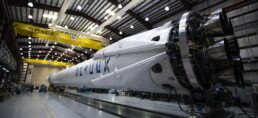Accounting in Space
With the recent (as of this writing) “rapid, unscheduled disassembly” of SpaceX’s Starship, private space travel is back in the news. Though it seems like a unique industry, more the hobby of billionaires flaunting their wealth while simultaneously striving for mass techno-visionary appeal, space travel is a business like any other. And every business, regardless of how frequently its product, quite literally, blows up, needs accounting.
Obviously, companies like Blue Origin need accounting for the basic things, like running payroll, setting up cap tables, or recording expenses. But there are a few things about space travel that make the necessary accounting much more unique.

A spaceship poses an interesting challenge when it comes to fixed asset management. Typically, a multi-use vessel is sent into space with single-use boosters. Of course, despite their limited lifespan, boosters are still massive expenditures which must be capitalized. If doing a cost-segregation study on a building for accelerated depreciation is complicated, how much more so is the accurate recording of disposal of rocket ship components? What even is the depreciable life of a spaceship?
When discussing accrual of activities within the fiscal cycle, you would also think of the subject of unearned revenue. Unlike Southwest, I doubt anyone is buying LunarX tickets same-day. Since space launches can be delayed for any number of reasons, it would make sense that revenue would not be recognized until a successful launch. However, in the event of a multi-day trip, is it recognized as time of launch, or after landing (presumably, with all passengers alive and well)?
 How are the flights being paid for? Are foreign currencies accepted? Cryptocurrencies? If so, there would be additional conversions and gain/loss on those conversions to account for.
How are the flights being paid for? Are foreign currencies accepted? Cryptocurrencies? If so, there would be additional conversions and gain/loss on those conversions to account for.
Of course, one of my favorite accounting topics is sales tax. Though, as of this writing, there is no sales tax on space travel, the idea has been floated by politicians before. The proposed SPACE (“Securing Protections Against Carbon Emissions”) Tax Act would charge passenger taxes and increasing excise taxes for orbital height. This act was proposed in 2021 and appears to have not yet gone any further, however, it is not unreasonable to think others might be forthcoming. If such a tax were to pass, the process by which nexus was determined could be fascinating. Would only the point of launch have nexus, or could states try to establish nexus for commercial space travel going over their airspace?
In addition to operational accounting topics, it stands to reason that these billionaire-founded companies would find ways to get considerable tax considerations, potentially even laws and loopholes (or at least incentives) written solely for their benefit. Fortunately for them, I am sure they have teams of accountants at their disposal, on standby to address every question and concern.

